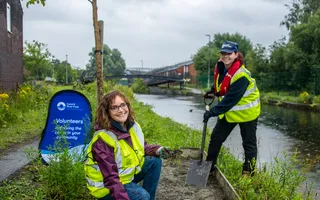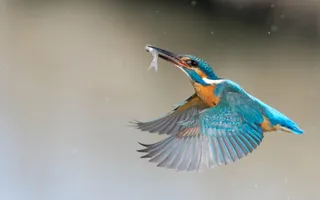The role that angling clubs’ bailiffs play in looking after our fisheries is vital. Not least for spotting illegal fishing or pollution issues. But did you know many of them are volunteers?
They're a unique set of volunteer eyes and ears. Every club or organisation with an agreement for fishing rights with us, must provide adequate bailiffing.
There are two sorts of canal angling bailiffs:
1. Water bailiffs
The Environment Agency (EA) and Natural Resources Wales (NRW) employ ‘water bailiffs' to enforce the Salmon & Freshwater Fisheries Act 1975 as amended (SAFFA) and various other legislation, such as the Eel regulations 2009 and the Keeping and Introduction of Fish regulations 2015, for which is required a KIFR permit.
Water bailiffs carry warrants and have the same powers of arrest as police. They can enter property, check rod licences and arrest people.
There are currently around 70 full-time EA bailiffs, and it's certainly an opportunity for anyone looking for a career in fisheries.
2. Angling club bailiffs
Angling club bailiffs are legally ‘water keepers'. They don't have any special legal powers. However, they do carry out the authority of their employer (although most are actually volunteers), which is the fishery owner or angling club to whom they report. The water keeper has the power to prevent the civil wrong of trespass.
When an angler breaks the fishery rules, such as using a bait or method not allowed as part of the permission granted with their fishing permit, then this makes the offending angler a trespasser in law. That's why the wording used by fishery owners and angling clubs on their permits is important. It allows water keepers to check anglers' permits, tackle and boxes.
What else do angling club bailiffs do?
Fish in distress
Angling club bailiffs are often the first to notice pollution or fish in distress in our waterways. Whether it's a ‘light diesel rainbow sheen' or something more serious that has killed or caused distress to fish, the club bailiffs, like any member of the public, should report the matter immediately to the relevant authorities.
- In England, call the Environment Agency on 0800 807 060
- In Wales, call Natural Resources Wales on 0300 065 3000
Where fish are clearly in distress, please contact us too, as it's also our responsibility to rescue distressed fish on our waterways.
Illegal fishing methods
Stealing of fish using rod and line
Catching a fish by rod and line and then taking it away from one of our canals, rivers or fisheries is theft. If you see someone stealing fish, report it to the police immediately by calling 101.
Removing non-native fish
However, if a non-native fish species is caught it must not be returned to the water. You'll find more details in our 'Spotted anything fishy from your boat?' blog.
Collecting the pennies
The most familiar role of angling club bailiffs is to check anglers have paid their annual or day membership fees.
Fishing without proper payment is also theft. Although, most clubs who rent water on our waterways will offer day tickets on the bank at between £3 and £6. You can pay the bailiff in cash.
It's the dedicated club bailiff who patrols the waterways day in day out. As a volunteer, the club bailiff may take a little of the money collected as a contribution towards wear and tear of their vehicle. They do it for the love of their club and of the sport of angling, because every little helps when it comes to keeping angling clubs solvent.
Bogus bailiffs
A water bailiff, such as those working for the Environment Agency, will always produce a valid warrant. You have the right to inspect it and you also have the right to ask what powers they are working under. Since water bailiffs are legally classified as constables, it's an offence to impersonate them. The water bailiff will never ask to take money from you on the bank, as you must buy your rod licence before you go fishing and you cannot buy it from a patrolling water bailiff.
The stretches of our water that we control under the Waterway Wanderers scheme are fishable only by buying an annual permit in advance. We don't issue Waterway Wanderers day permits, so you'll never be asked for day permit monies. You will be asked to leave and we may pursue a Theft Act offence.
Bogus angling club bailiffs
If an angling club bailiff is impersonated, this is fraud with an intention to take money or fishing tackle. This is false representation and is an offence under the Fraud Act 2006.
If you're not a club member, angling club bailiffs will ask you to buy a day permit. This is also true if you are fishing from your kayak or boat. Where day permits are not available under club rules, then you should never start fishing unless you are a full club member.
If you're not happy with the identification of the bailiff, or if they don't have any identification on them, speak to a club official. A genuine club bailiff will happily provide you with the contact details of a senior club official, the bogus one will definitely not. If in doubt, never hand over money.
The bailiff may phone the police and request their attendance. However, if you have reasonable doubt about the credentials of the bailiff, then the police officer will understand your position.
Guidance for clubs
Clubs need to make sure their appointed bailiffs/water keepers are issued with appropriate cards with a photo ID and numbering system, to ensure they can be identified easily if there is any doubt. If this can be supported by club-badged clothing then it adds credibility and authority to the bailiff, which will help to achieve compliance without conflict.
Before appointing a club bailiff/water keeper, the club should check for criminal records, DBS checks, etc. The best bailiffs are those that can keep calm under pressure, manage the situation, take details, read the developing situation and stay safe. While selecting the right candidate with the right characteristics is important, clubs also need to provide support for this demanding role. Knowledge about conflict resolution, health and safety, 'the use of force' and taking notes/observations are all essential skills.
As mentioned earlier, the powers of an angling club bailiff/water keeper are very limited. We recommend all clubs read and embed the principles from the Angling Trust's best practice guide for angling club bailiffs.
Voluntary Bailiff Service
The new kids on the block are the Voluntary Bailiff Service (VBS) which is being run by the Angling Trust. This great initiative involves club bailiffs supporting the authorities' own water bailiffs by gathering intelligence and in some cases checking rod licences for compliance.
Find out more about the Voluntary Bailiff Service and how you can apply to get involved.







